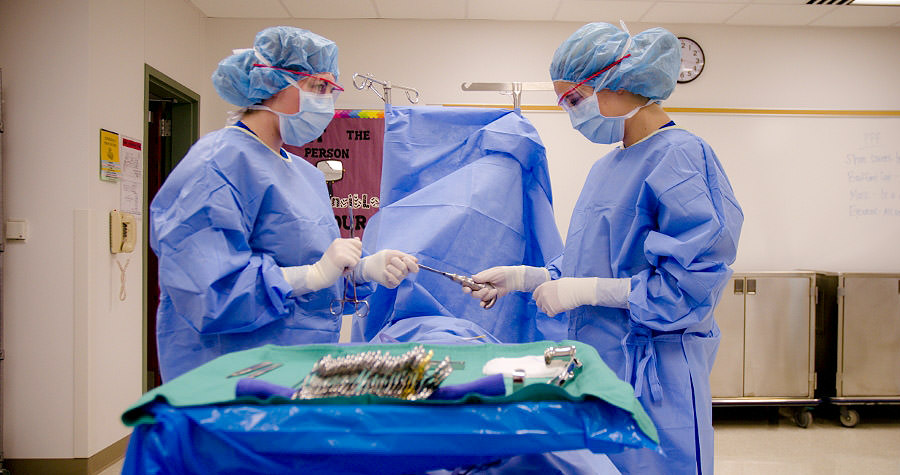Surgical Technology
About
Admissions
Career Opportunities
Degrees & Certificates
Program Contact

Mission Statement
The ECC Surgical Technology Program empowers graduates to pass the NBSTSA Certification exam and function as surgical technologists in diverse health care settings. The graduates of the program enrich our communities by contributing to the service workforce, providing safe, competent, professional care in a diverse and ever-changing allied healthcare field.
The Surgical Technology program is offered at the East Central College Rolla Main campus located at the Rolla Technical Center. Surgical Technology is a one-plus-one-degree program that prepares students to practice as surgical technologists (ST). Upon graduation, students will receive their Associate of Applied Science Degree in Surgical Technology and will be eligible to take the national certification examination administered by the National Board of Surgical Technology and Surgical Assisting (NBSTSA) to obtain certification. Surgical Technologists work in a variety of settings including hospital surgery units, surgical centers, labor and delivery, dentists/oral surgeons offices, veterinary offices, travel companies, and central sterile supply units.
Students will learn using state-of-the-art equipment in the surgical suite simulation lab and classroom that they will then apply in a clinical externship. Surgical Technologists are vital members of the surgical team. Students will learn concepts of aseptic technique, instrumentation, surgical procedures, and patient care. Additionally, students learn to anticipate the needs of the surgeon and assist the surgeon throughout the procedure.
East Central College also offer the Surgical Technology AAS completion degree that promotes life-long learning and improves patient-centered care. The Surgical Technology AAS Completion degree option is designed to meet the needs of current Certified Surgical Technologist (CST). To be eligible for this AAS completion degree, the student must have graduated from an accredited surgical technology program with an earned Certificate of Achievement (CA) and currently hold the certification as a credentialed CST in good standing. Upon completion of the 27 general education prerequisite credit hours, students core surgical technology course work from their program will be articulated as a Pass/Fail and transcribed at East Central College’s courses of: SRG 200–295.
Upon completion of the program, students are eligible to take the National Certifying Examination offered by the National Board of Surgical Technology and Surgical Assisting (NBSTSA) to become a Certified Surgical Technologist (CST). The CST is recognized nationally but is not required for employment in Missouri. East Central College Surgical Technology program requires students to sit for the certification in order to complete the program and successfully graduate.
The East Central College Surgical Technology program is fully accredited by the Commission on Accreditation of Allied Health Education Programs upon the recommendation of the Accreditation Review Council on Education in Surgical Technology and Surgical Assisting.
Additional Information & Helpful Links:
- Accreditation Review Council on Education in Surgical Technology and Surgical Assisting
- The National Board of Surgical Technology and Surgical Assisting
Professional Organizations:

Commission on Accreditation of Allied Health Education Programs
9355 – 113th St. N, #7709
Seminole, FL 33775
727-210-2350

ARC/STSA
6 W. Dry Creek Circle, Suite #110
Littleton, CO 80120
303-741-3655
Request Info
If you would like more information about our Surgical Technology program, fill out our form and we will contact you.
To enter this course of study, students must meet these institution and program-specific criteria:
- High school diploma or the equivalent
(documentation must be sent to the registration office) - Application for admission to ECC
- A placement test as specified by the college
(some coursework requires minimum placement results) - Cumulative college GPA of 2.0 or greater
- TEAS Admission Test taken in the last two years with a minimum composite score of 50%
- Completion of prerequisites with a “C” or better
- 4 Hours of Job Shadowing
- Satisfactory criminal background check and
drug screening once accepted to the programmer
Surgical Technology Admissions Test Due June 1, 2025
Application Information
Surgical Technology Application 2025
*Due June 1, 2025
Surgical Technology Student Handbook 2024–2025
Job Shadowing Resources for Applicants
Mercy Washington
Mercy Washington Job Shadowing
Missouri Baptist Sullivan
SM-MBSH_Shadowing@bjc.org
573-468-4186 x 1827
Phelps Health
Mid-Missouri Area Health Education Centers
Additional Information & Links:
Career Opportunities
Surgical Technologists are vital members of the surgical team. Surgical technologists work under the supervision and delegatory authority of a surgeon to facilitate the safe and effective conduct of invasive and non-invasive surgical procedures, ensuring that the operating room environment is safe, that equipment functions properly, and that the operative procedure is conducted under conditions that maximize patient safety. Surgical technologists are experts in the theory and application of the principles of asepsis and sterile technique to combine the knowledge of human anatomy, surgical procedures, and implementation and tools and technologies to facilitate a physician’s performance of invasive therapeutic and diagnostic procedures.’(AST)
Employment Opportunities and Salary Ranges:
The surgical technology profession is experiencing faster-than-average job growth. Employment for surgical technologists is projected to grow 7 percent from 2019 to 2029, faster than the average for all occupations according to the Bureau of Labor Statistics, Occupational Outlook Handbook. Individual salaries vary by geographic location, amount of education and experience, and the type and size of the employer. On average, a surgical technologist will start with an annual salary of $52,000-$60,000 ($25-$29 per hour). For more information about a career in surgical technology please refer to the Occupational Outlook Handbook.
Surgical technologists find opportunities in several areas:
- Hospital surgery units
- Outpatient surgical centers
- Labor and delivery
- Dentists/oral surgeons offices
- Veterinary offices
- Travel companies
- Central sterile supply units
Surgical Technologist Fact Sheet
Surgical Technology AAS Completion Fact Sheet
Surgical Technology Student Program Curriculum Outcome Goals
To prepare entry-level Surgical Technologists who are competent in the cognitive (knowledge), psychomotor (skills), and affective (behavior) learning domains to enter the profession. Upon completion of the program of Surgical Technology, the Graduate Surgical Technologist shall:
- Apply knowledge and skills from the biological sciences to safely perform during the preoperative, intraoperative, and postoperative phases of patient care.
- Cognitive Domain: Students must complete coursework in anatomy and physiology, and apply the knowledge obtained as the basis for understanding theoretical surgical technology concepts taught in all trimesters.
- Psychomotor Domain: Surgical technology laboratory courses incorporate the fundamentals learned during science courses as students practice the motor skills associated with operating room competencies.
- Affective Domain: Students learn to apply critical thinking skills, using knowledge learned during basic biological science courses as the basis for decisions made during the performance of operating room procedures.
- Utilize appropriate medical terminology to communicate clearly and effectively with patients, physicians, and co-workers and provide for accurate documentation.
- Cognitive Domain: Students learn the pronunciation, spelling, and meaning of the most commonly used medical terms in preparation for application within the surgical setting.
- Psychomotor Domain: Practical application of words and abbreviations in operative reports and documentation is practiced and assessed in the laboratory classes and during clinical rotations.
- Affective Domain: Students learn that the appropriate use of medical terminology promotes professionalism and identity as a member of the surgical team.
- Employ appropriate ethical, professional, and respectful values while providing care to diverse populations within the healthcare system.
- Cognitive Domain: Students are introduced to the concepts of professionalism, ethics, and values during the first Professional Prep course; “Ethics and Professionalism”. Knowledge regarding ethical issues forms the framework for safe and ethical practice. Promotion of the profession at the state and national level is emphasized throughout the program. Cultural competency concepts are reinforced throughout the program to provide students with the tools needed to practice culturally competent care.
- Psychomotor Domain: Students practice and are assessed for their application of professional attributes in the classroom, laboratory, and clinical rotations.
- Affective Domain: The concepts of professionalism are taught throughout the program to guide student behavior in the profession of surgical technology. Interactive assignments where students discuss and challenge each other facilitate student’s understanding of their own frame of reference, enabling students to understand how their cultural and ethical mindset impacts their interactions with patients and the surgical team.
- Demonstrate a strong surgical conscience, accountability, and legal implications of an individual’s actions as a member of the surgical team.
- Cognitive Domain: Students are introduced to the concepts of surgical conscience, accountability, and legal implications of one’s actions throughout the entire Surgical Technology Program. The concepts are reinforced in every course throughout the program as they are fundamental to the profession.
- Psychomotor Domain: Students practice and are assessed for their application of surgical conscience and accountability in the classroom, laboratory, and clinical rotations. Legal concepts, such as charting and compliance with confidentiality, are assessed during clinical rotations.
- Affective Domain: The concepts of surgical conscience, accountability, and legal implications are taught at the beginning of the program to guide student behavior in the profession of surgical technology.
- Integrate knowledge gained in core surgical technology courses to prepare for and assist with surgical interventions.
- Cognitive Domain: Surgical Technology courses are designed to provide students with the theoretical basis to prepare for and assist with surgical interventions. Knowledge gained is sequential, progressing from the simple to the complex, enabling students to evolve from simple comprehension of theoretical material to application of complex skills.
- Psychomotor Domain: During laboratory courses and clinical rotations, students progressively apply the theoretical surgical technology concepts in the performance of surgical technology competencies.
- Affective Domain: Knowledge gained in ST courses prepares students for the emotional challenges that may be encountered before, during and after surgical interventions.
- Utilize learned competencies to assemble and operate instruments, equipment and supplies for the delivery of patient care as an entry-level practitioner during basic surgical procedures.
- Cognitive Domain: Surgical Technology laboratory and clinical courses are designed to provide students with the practical skills to prepare for and assist with surgical interventions, knowledge gained is sequential, progressing from the simple to the complex, enabling students to evolve from simple comprehension of theoretical material to application of complex skills.
- Psychomotor Domain: During laboratory courses and clinical rotations, students progressively apply skills in the performance of surgical interventions.
- Affective Domain: Knowledge gained in laboratory and clinical courses prepare students for entry- level practice as a surgical technologist.
- Demonstrate the ability to prioritize and organize the surgical field, while considering the physiology and urgency of patient care needs.
- Cognitive Domain: Surgical Technology courses are designed to provide students with the theoretical basis to prepare for and assist with surgical interventions. Knowledge gained is sequential, progressing from the simple to the complex, enabling students to evolve from simple comprehension of theoretical material to application of complex skills.
- Psychomotor Domain: During laboratory courses and clinical rotations, students progressively apply the concept of prioritization and critical thinking skills in the performance of surgical technology competencies.
- Affective Domain: Students learn to apply critical thinking skills, using knowledge learned during core courses as the basis for decisions made during the performance of operating room procedures and basic perioperative patient care.
- Demonstrate an entry-level knowledge base by successfully completing the Certification exam.
- Cognitive Domain: Surgical technology core and supporting courses are designed to provide students with the theoretical basis to take the Certification Exam.
- Psychomotor Domain: Students apply knowledge from all core/supporting course work in taking the Certification Exam.
- Affective Domain: Students integrate knowledge from all core/supporting coursework regarding the values that characterize the profession of surgical technology in taking the Certification exam.
Jennifer Wall, M.Ed., CST
Program Director
ECC-Rolla Main-Office 135
500 Forum Drive
Rolla, MO 65401
573-899-8053
jennifer.wall@eastcentral.edu
Megan VanBibber, BS, CST
Clinical Coordinator
ECC-Rolla Main-Office 137
500 Forum Drive
Rolla, MO 65401
573-899-8054
jennifer.wall@eastcentral.edu
Nancy Mitchell, MSN, RN
Dean of Health Sciences
Health Science Building – Suite 105
1964 Prairie Dell Road
Union, MO 63084
636-584-6616
nancy.mitchell@eastcentral.edu
Julie Beck
Program Assistant for Allied Health
Health Science Building – Suite 105
1964 Prairie Dell Road
Union, MO 63084
636-584-6616
julie.beck@eastcentral.edu
General office hours: Monday, Tuesday, Wednesday *8:30 a.m.–3:30 p.m.
